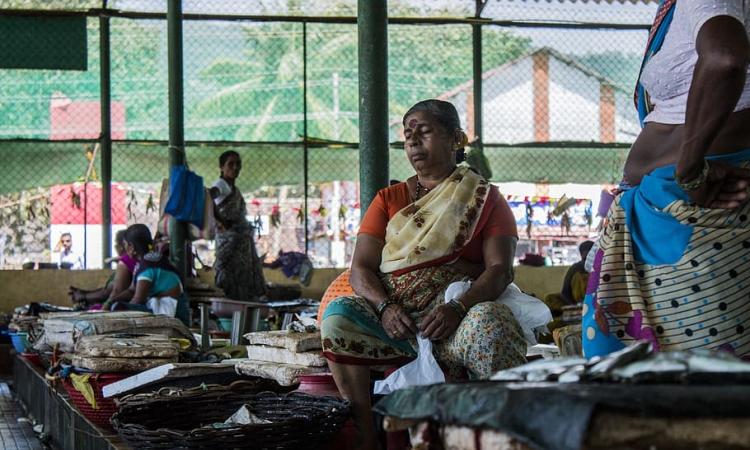
Small-scale fishers in India are increasingly forced to migrate for their livelihoods, but new research from the University of East Anglia (UEA) finds this can have positive impacts not always seen when labourers have to move for work.
Prof. Nitya Rao, Professor of Gender and Development in UEA’s School of Global Development, led the study. She is the author of the paper ‘Identity, Sociality and Mobility: Understanding Internal Fisher Migration Along India’s East Coast’, published in the journal Maritime Studies.
The study looked at internal migration – in this case, from the coastal villages of Cuddalore district to the major harbours such as Chennai, where small-scale fishers find more opportunities through technological improvements, larger capital investments, scope for multiday fishing and expert promotion.
Marine fishing in India is a caste-based occupation, with its own social and political hierarchy responsible for the governance and management of common resources.
For those belonging to the subordinate fishing castes, excluded from decision-making processes, migration is an important strategy for gaining economic resources, social power, and recognition as skilled and successful marine fishermen.
Factors such as coastal erosion and frequent natural hazards, the lack of infrastructure, and poor marketing facilities make small-scale fishing precarious in coastal villages, such as those in the Cuddalore district examined in the study.
Migration is also rapidly increasing because of a complex range of factors: the seasonal depletion of fish resources, climate change and environmental hazards, conflict, as well as changes in the global political economy.
Prof. Rao said: “This case study provides us some lessons on how processes of internal migration can work more productively for marginalised groups, in this case, fishers. Contrary to the stories of bare survival, or worse, exploitation, these findings demonstrate the possibilities for positive wellbeing outcomes.”
A key finding was the “silent though critical role” of women in helping these migrant workers build success, the study found.
Prof Rao said: “Women in boat-owning households have withdrawn from active participation in fisheries, yet without their meticulous attention to sociality and social organisation, the transformation in their lives over a generation would not have been possible.”
By arranging marriages and encouraging amicable and supportive family relations, women ensure the wellbeing and success of migrant worker networks, known locally as Vagaira.
This unique social organisation is based on bonds between siblings and their marital families. The Vagaira system has helped these families build substantial physical and social capital, including constructing good houses and providing quality higher education to their children. It also provides moral and financial support, especially in times of crisis.
Prof Rao said: “We find that family and its social organization, in particular kinship and marriage ties brokered by senior women, are significant factors in facilitating successful migration. Recognising women’s contributions to the sector, both direct and through their social reproductive and networking activities, is crucial for achieving wellbeing and sustainability outcomes.”
Rapport and trust within the Vagaira are strong. The group members depend on each other for emergency cash and capital, technical knowledge, marketing support, and conflict resolution to start and expand their businesses. Transparency in sharing information about their fishing assets, like crafts, gear, and other equipment, creates team spirit.
As one participant in the study said: “If an engine or a gearbox on a boat is faulty, other members share their spare engine or gearbox to overcome this situation. Secondly, if a boat lands with less catch, four to five fishers from the Vagaira group come together to analyse its causes—is it due to the mistake of the driver, a damaged net, or something else. They then suggest different ideas, but also provide support to fix the problem.”
Marketing is another key area where the Vagaira members work collectively, sharing responsibilities to fetch a better price.
Prof Rao said: “Establishing a family group that is both loyal and trustworthy, and willing to support each other in times of adversity, is a conscious mobility strategy. Rather than taking family solidarity for granted, building social capital has been an intentional process, requiring planning and risk-taking. Their steadfast commitment to both their fisher identity and sociality ultimately paid off, making for the aspirational transition from workers to boat-owners.”
The project looked at coastal transformations and fisher wellbeing across the UK, France, Slovenia, Norway, and India. It was funded by the Economic and Social Research Council.
‘Identity, Sociality and Mobility: Understanding Internal Fisher Migration Along India’s East Coast’, published Springer Link in the journal Maritime Studies.
About the University of East Anglia
The University of East Anglia (UEA) is a UK Top 25 university and is ranked in the top 50 globally for research citations. Known for its world-leading research and good student experience, it was awarded Gold in the Teaching Excellence Framework and is a leading member of Norwich Research Park, one of Europe’s biggest concentrations of researchers in the fields of environment, health, and plant science. www.uea.ac.uk
/articles/how-internal-migration-can-work-more-productively-fishers